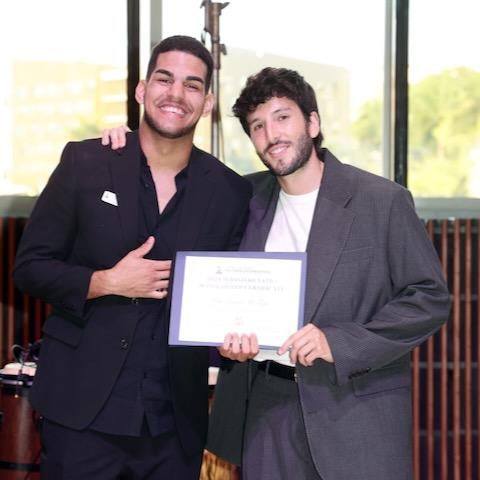Alumni Profile: Ishaan Chhabra ’10

Ishaan Chhabra
Photo: Mike Spencer
Ishaan Chhabra was 3 years old when he heard something so wondrous that it stamped the first indelible imprint on his memory. It was the industry-changing soundtrack to the 1992 Indian blockbuster Roja that had made composer A. R. Rahman a household name across India.
“I just felt some sort of connect,” Chhabra said. “I hadn’t heard anything like that before.” At the time, Southern Indian films rarely made it to New Delhi, where Chhabra’s family lived. But by fusing southern and northern Indian genres, Rahman crossed over and created a sound that felt familiar to Indians from Chennai to Mumbai to Kolkata. It was like a polestar to Chhabra, leading him to a career in film music, with Rahman himself a guiding force.
Today Chhabra, who graduated from Berklee as an electronic production and design (EPD) major in 2010, is one of Rahman’s core music producers, having worked on more than 20 films with him over the course of the past five years, in addition to having forged an independent scoring career.
Chhabra’s talent for music was clear to his family since he was small. An uncle who played bass for an Indian classic rock band bought Chhabra a drum set when he was four years old. On his sixth birthday, he got a keyboard, and within minutes of touching it, he played the Indian national anthem. His parents hired an instructor right away. By the time Chhabra was 10, he attended the Delhi School of Music for weekly lessons.
At the same time, Chhabra would hang out backstage at his uncle’s concerts, including one in which the percussionist Sivamani—a longtime friend and associate of Rahman’s—was on the bill. Chhabra, then 13, told Sivamani that he was a keyboardist and would love to meet Rahman someday.
A Random Kid from Delhi
Sivamani remembered, and two years later called Chhabra to ask if he would like to come to Chennai, where Rahman is based. Chhabra didn’t hesitate. Though the meeting only lasted a few minutes, it “meant the world” to the teenager. Rahman gave him his email address, and every few months thereafter Chhabra would drop him a line, asking him about his latest production, about the instruments and techniques he used. “And he was kind enough to reply every time in spite of being who he is. I was just this random kid from Delhi.”
During that brief meeting, Rahman again altered the course of Chhabra’s life. “He was the one who told me about there’s this place in Boston called Berklee, [and said], ‘You should check it out,’” Chhabra recalls.
By the time he arrived on campus, he knew he wanted to be a film composer, but decided to major in EPD while taking film scoring electives. In addition to giving him technical chops, Berklee widened Chhabra’s musical vocabulary. He learned, for example, to appreciate jazz for the first time, and his overall sonic worldview expanded. “Being in India, you were not exposed to all these top-notch faculty or even top-notch students,” he says.
His production skills led him to an internship at Sonivox that turned into a full-time job as an instrument sound designer for a percussion library, developing presets and sound palettes, and making demos for the company’s marketing department.
Uncanny Luck
In 2013, two years into the job at Sonivox, Chhabra heard from a friend at home who was writing songs for the feature film Children of War. The film needed a score, and he wanted to know if Chhabra would be interested in writing it.
Chhabra took a 10-day leave from his work at Sonivox and flew to Delhi. Shortly after he arrived, he got another call. It was Rahman’s sound engineer, asking him to come to Chennai.
“It was really uncanny,” Chhabra says of the back-to-back opportunities. Once in Chennai, he talked to Rahman for about five minutes. “It was kind of a blur because I was in disbelief the whole time,” he says. Rahman wanted him to write a two-minute piece to open his upcoming concert— something cinematic, electronic, with strong sound design.
But Chhabra needed to be in Mumbai for his Children of War gig. That was fine with Rahman who said Chhabra could work remotely from Mumbai. Chhabra gave Sonivox his notice and has been in India since.
Score by Score
The initial commission led to an offer to do music programming and additional music production for the Disney movie Million Dollar Arm, a months-long gig during which he worked closely with Rahman. Score by score, Chhabra became one of Rahman’s core music producers. As such, he takes a line that Rahman hums or plays on the piano and turns it into a fully produced track, often under Rahman’s guidance.
Chhabra’s specialty on the team is creating scores that blend orchestral and electronic sounds. Rahman has asked him to work on several international productions, including the 2017 British film Viceroy’s House, and on Hollywood and Hindi films.
In August, Chhabra was working closely with Rahman to put the final touches on an Amazon Prime series called Harmony with A. R. Rahman, a series about the virtuoso’s travels to remote parts of India to find and play rare instruments.
Alongside Chhabra’s projects with Rahman, he has gradually built a body ofwork. In addition to Children of War, he has scored the films: Budhia Singh: Born to Run and Omerta. The Hollywood Reporter called the score to the latter “thrilling and portentous.” Another film he scored, the National Geographic documentary The President’s Bodyguard, was screened at the Indian president’s home in Delhi on August 15.
“It’s been quite a ride,” Chhabra says. “Doing this you don’t realize how fortunate you are to be in this position. But I do feel fortunate to be doing what I want to do.”




